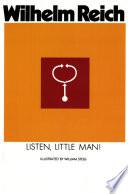
Listen, Little Man! (1948)
Context: You beg for happiness in life, but security is more important to you, even if it costs you your spine or your life. Your life will be good and secure when aliveness will mean more to you than security; love more than money; your freedom more than party line or public opinion; when your thinking will be in harmony with your feelings; when the teachers of your children will be better paid than the politicians; when you will have more respect for the love between man and woman than for a marriage license.
